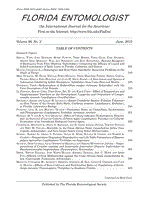The Asian citrus psyllid (ACP), Diaphorina citri Kuwayama (Hemiptera: Liviidae), is an important pest of citrus. Research into strategies to control ACP is ongoing at many facilities, including at the USDA-ARS U.S. Horticultural Research Laboratory (USHRL) in Fort Pierce, Florida. The USHRL maintains colonies of ACP, but their survival is often threatened by mites which render host plants unsuitable for ACP Our objective was to identify miticides/insecticides that could be used to control mite outbreaks with minimal or no adverse affect on ACP We tested the following 6 miticides in greenhouse trials for their toxicity to each life stage of ACP and also investigated sublethal effects on development and oviposition of ACP: bifenazate (Acramite 50 WS), spirodiclofen (Envidor 2 SC), dicofol (Kelthane MF), pyridaben (Nexter), petroleum oil, and chlorfenapyr (Pylon). The miticides differed in their toxicity when applied directly to ACP Bifenazate was the only miticide that was not toxic to any life stage of ACP, whereas pyridaben and chlorfenapyr, which are also labeled as insecticides, were toxic to all life stages of ACP Petroleum oil and dicofol killed adult and nymphal ACP, but were nontoxic to eggs. Spirodiclofen was nontoxic to adults, but reduced nymphal survivorship and killed eggs. The duration of residual activity against adult ACP also was widely variable: dicofol residues were only toxic for up to 10 days, whereas chlorfenapyr residues were still toxic after 36 days. We recommend using dicofol, pyridaben, petroleum oil, and chlorfenapyr to maintain clean plants prior to colonization by ACP and then rotating bifenazate and spirodiclofen, if maintaining adult ACP, or bifenazate, dicofol, and petroleum oil, if maintaining eggs. Bifenazate is the only product safe for maintaining nymphal ACP Our results are useful for research facilities that wish to maintain colonies of ACP and control mites and may be useful for citrus growers and researchers that wish to kill ACP and mites with a single treatment.
How to translate text using browser tools
1 June 2013
Toxicity of 6 Miticides to the Asian Citrus Psyllid, Diaphorinacitri (Hemiptera: Liviidae)
Matthew L. Richardson,
David G. Hall

Florida Entomologist
Vol. 96 • No. 2
June 2013
Vol. 96 • No. 2
June 2013
aceite de petróleo
bifenazate
bifenazato
Chlorfenapyr
clorfenapir
dicofol
espirodiclofeno




